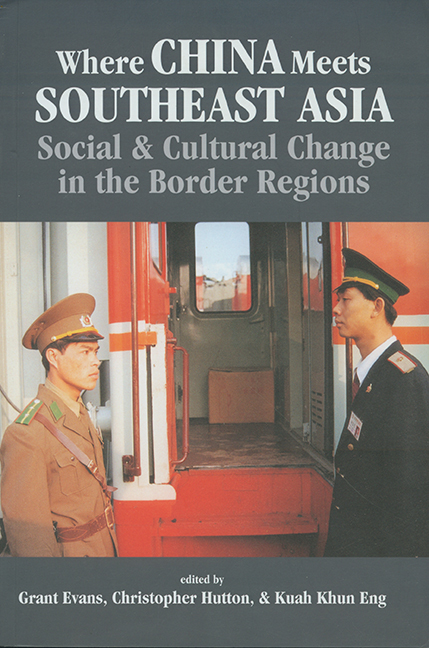Book contents
- Frontmatter
- Contents
- Contributors
- Map
- Introduction: The Disappearing Frontier?
- 1 Where Nothing Is as It Seems: Between Southeast China and Mainland Southeast Asia in the “Post-Socialist” Era
- 2 The Southern Chinese Borders in History
- 3 Ecology Without Borders
- 4 Negotiating Central, Provincial, and County Policies: Border Trading in South China
- 5 The Hmong of the Southeast Asia Massif: Their Recent History of Migration
- 6 Regional Trade in Northwestern Laos: An Initial Assessment of the Economic Quadrangle
- 7 Lue across Borders: Pilgrimage and the Muang Sing Reliquary in Northern Laos
- 8 Transformation of Jinghong, Xishuangbanna, PRC
- 9 The Hell of Good Intentions: Some Preliminary Thoughts on Opium in the Political Ecology of the Trade in Girls and Women
- 10 Cross-Border Mobility and Social Networks: Akha Caravan Traders
- 11 Cross-Border Links between Muslims in Yunnan and Northern Thailand: Identity and Economic Networks
- 12 Trade Activities of the Hoa along the Sino-Vietnamese Border
- 13 Cross-Border Categories: Ethnic Chinese and the Sino-Vietnamese Border at Mong Cai
- 14 Regional Development and Cross-Border Cultural Linkage: The Case of a Vietnamese Community in Guangxi, China
- 15 Women and Social Change along the Vietnam-Guangxi Border
- Index
3 - Ecology Without Borders
Published online by Cambridge University Press: 21 October 2015
- Frontmatter
- Contents
- Contributors
- Map
- Introduction: The Disappearing Frontier?
- 1 Where Nothing Is as It Seems: Between Southeast China and Mainland Southeast Asia in the “Post-Socialist” Era
- 2 The Southern Chinese Borders in History
- 3 Ecology Without Borders
- 4 Negotiating Central, Provincial, and County Policies: Border Trading in South China
- 5 The Hmong of the Southeast Asia Massif: Their Recent History of Migration
- 6 Regional Trade in Northwestern Laos: An Initial Assessment of the Economic Quadrangle
- 7 Lue across Borders: Pilgrimage and the Muang Sing Reliquary in Northern Laos
- 8 Transformation of Jinghong, Xishuangbanna, PRC
- 9 The Hell of Good Intentions: Some Preliminary Thoughts on Opium in the Political Ecology of the Trade in Girls and Women
- 10 Cross-Border Mobility and Social Networks: Akha Caravan Traders
- 11 Cross-Border Links between Muslims in Yunnan and Northern Thailand: Identity and Economic Networks
- 12 Trade Activities of the Hoa along the Sino-Vietnamese Border
- 13 Cross-Border Categories: Ethnic Chinese and the Sino-Vietnamese Border at Mong Cai
- 14 Regional Development and Cross-Border Cultural Linkage: The Case of a Vietnamese Community in Guangxi, China
- 15 Women and Social Change along the Vietnam-Guangxi Border
- Index
Summary
Ecology, as conventionally defined, is a science that deals with interactions between living organisms and their physical environment. Human beings have now achieved such a dominant role that they are an unprecedented ecological factor controlling ecosystems on the planet. A more practical way to define ecology might be to say that it concerns human beings in relation to their living environment, a relationship which has developed into a serious crisis.
All things undergo change in structure and function through time and space, and ecosystems are no exception. To define how “ecochange” works in practice is difficult, but it may be useful to express eco-change in terms of the loss of biological diversity. Biological diversity or biodiversity is the totality of genes, species, and ecosystems in a region. Human cultural diversity could also be considered part of biodiversity.
Borders are frontier areas of national states. In imagination and application, borders are political constructions which cut across the natural environment. There are of course differences in political systems, economic processes, and cultural activities between states. However, the differences on the ground are not great in the border areas between China and mainland Southeast Asia. For instance, there are eighteen transboundary ethnic minorities in these border areas (Liu Zhi 1994): the Zhuang, Dai, Bouyei, Miao (Hmong), Yao, Yi (Lolo), Hani (Akha), Jingpo (Kachin), Lisu, Lahu, Nu, Achang, Derung, Wa, Blang, Deang, Kemu, and Mang. Each group speaks its own language, but also shares some cultural experiences in the management of the natural resources with other ethnic groups. The border to them may be either meaningless or merely artificial; the ethnic groups of southwest China are bound by geography and history to the ethnic groups of mainland Southeast Asia.
Certainly, plants and animals do not carry passports to cross such borders. Ecology has no borders, but rather has niches. The borders of states are not binding on biological aspects of ecology.
- Type
- Chapter
- Information
- Where China Meets Southeast AsiaSocial and Cultural Change in the Border Regions, pp. 51 - 71Publisher: ISEAS–Yusof Ishak InstitutePrint publication year: 2000

